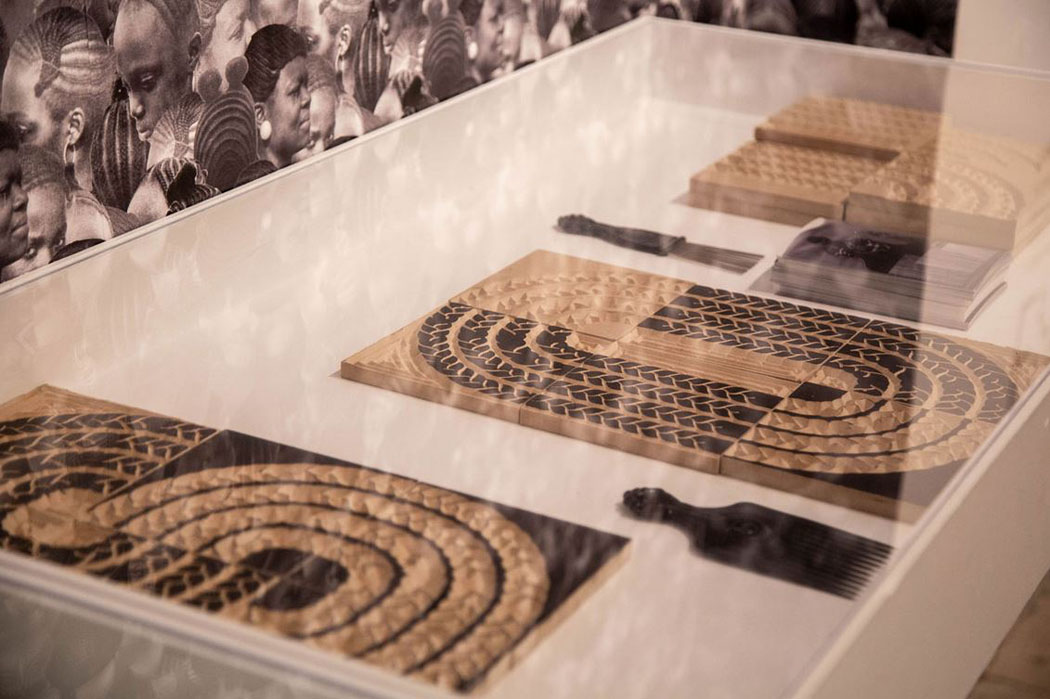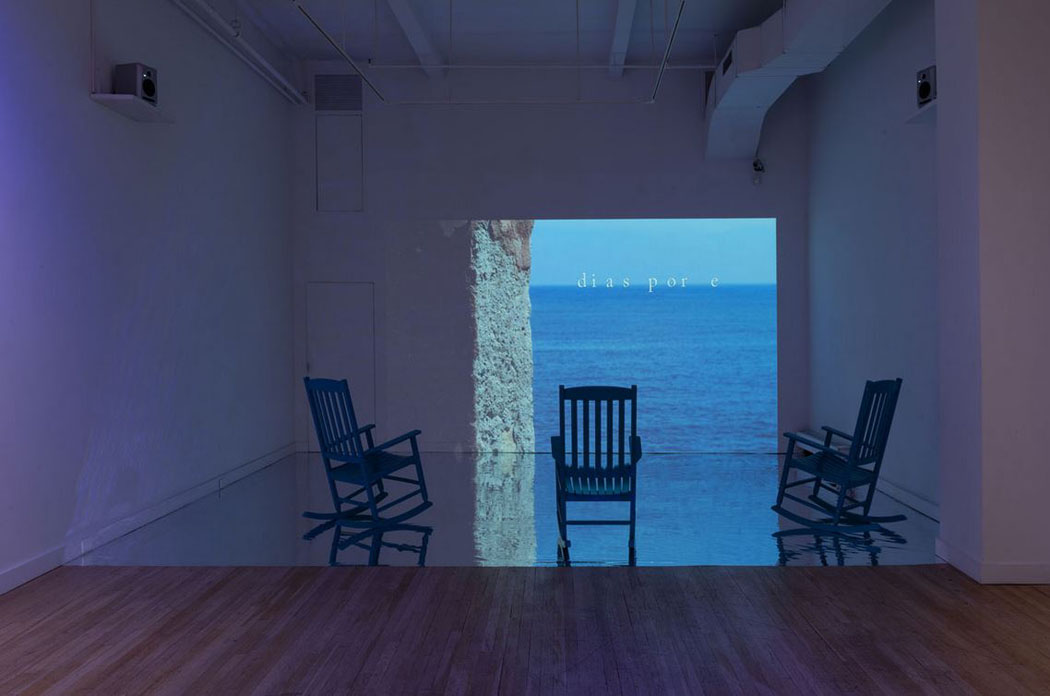
'States of Becoming'
A exhibition examining the dynamic forces of relocation, resettling, and assimilation that shape the artistic practices of a group of 17 contemporary African artists, and informs the discourse on identity construction within the African diaspora, will be on view this fall at Boston College's McMullen Museum of Art.
States of Becoming, presented through December 8, is curated by Fitsum Shebeshe and produced by Independent Curators International (ICI). The artists, who either relocated to the United States or are first-generation born, have lived and worked here within the last three decades.
The McMullen is the first New England venue to host the traveling exhibition of twenty-eight works across mediums including painting, photography, sculpture, installation, and video, which express the different ways in which identity is remade and reimagined.
.jpg)
Kearra Amaya Gopee, 'Artifact #3': Terra Nullius (video still), 2019. Courtesy the artist.
States of Becoming features works by notable artists Chukwudumebi Gabriel Amadi-Emina, Kearra Amaya Gopee, Kibrom Araya, Nadia Ayari, Vamba Bility, Elshafei Dafalla, Masimba Hwati, Chido Johnson, Miatta Kawinzi, Dora King, Helina Metaferia, Nontsikelelo Mutiti, Yvonne Osei, Kern Samuel, Amare Selfu, Tariku Shiferaw, and Yacine Tilala Fall.
The artists relocated from twelve countries in Africa and one in the Caribbean—Ethiopia, Ghana, Ivory Coast, Kenya, Liberia, Mauritania, Nigeria, Senegal, Sierra Leone, Sudan, Trinidad and Tobago, Tunisia, and Zimbabwe—with roots in cities across the US, including Detroit, Los Angeles, New Haven, New York, and Washington, DC.
“The McMullen Museum and Boston College’s African and African Diaspora Studies Program are pleased to present the recent work of seventeen outstanding artists, all of whom have been members of the African diaspora in the United States,” said Nancy Netzer, the inaugural Robert L. and Judith T. Winston Director of the McMullen Museum and a BC professor of art history.

Nontsikelelo Mutiti, 'Everything Is Where It Is Expected,' 2019 (Photo: Natasha Hatendi)
“Although practicing in a wide variety of mediums, these artists are united in the important questions their works probe about the role of relocation in reimagining hybrid identities and a sense of belonging. Such questions are fundamental to the liberal arts education at Boston College and, especially, to the pedagogy and research of our faculty in African and African Diaspora Studies. We look forward to engaging the community in productive dialogue sparked by these inspired works of art.”
The exhibition is arranged in three groups: artists whose relocation prompted aesthetic transformations by incorporating hybrid elements into their work; artists who share their experiences from their country of origin within their current communities; and artists who build bridges connecting the African diaspora to the United States in their practice. States of Becoming aims to contribute to conversations on identity construction in the face of relocation and resettling, exemplifying how diaspora artists navigate the interplay between ancestral African heritages and prevailing American cultural paradigms.
“The African and African Diaspora Studies Program was particularly drawn to the way the exhibition showcases core elements of our program,” said BC professor of history and program director Lorelle Semley. “Like our courses, these works reveal the global nature of the African diaspora. The tension between transformation and belonging emerges because the African diaspora is ‘everywhere’ yet often erased,” she added.
“The artists approach this phenomenon by engaging across multiple subjects including history, sociology, politics, visual and performing arts, literature, etc. Similarly, African diaspora studies puts different disciplines into dialogue, often through the creative use of materials and methods. We certainly hope that students make those deeper connections between African diaspora studies courses and the themes of the exhibition. However, we think it is more important for our students and the broader BC community to take the time to experience this artwork, with their hearts and their minds.”

Miatta Kawinzi, 'SHE GATHER ME,' 2021. (Photo: Miatta Kawinzi)
“States of Becoming was born out of my own process of relocating to the United States,” said exhibition curator Fitsum Shebeshe, who moved from Addis Ababa, Ethiopia, to Baltimore, Maryland, in 2016. “This exhibition allows for further understanding of not only my own experiences, but those of the artists. By analyzing both the unique aspects and commonalities together with Boston College’s global and local communities, we can reimagine together how we think about how identity is continually shaped and reshaped.”
According to Shebeshe, through relocation he gained firsthand knowledge of the weight of cultural assimilation and encountered a range of existential questions that shaped his relationship to institutions and culture. He also realized he was viewed as belonging to a minority and developed a newfound awareness of the profound impact Ethiopia’s traditional and conservative culture had on his sense of individuality.
He found kinship among cultural practitioners from the African diaspora who shared his experience, and united these artists in States of Becoming. Although their individual artistic methodologies and experiences vary, each seeks to reconceptualize a hybrid culture formed from real and imagined genealogies: cultural, racial, national, and geographical belonging. States of Becoming explores the artists’ process of identifying, redefining, and becoming themselves in both local and global contexts, opening up perspectives into multiple states both geographic and emotional in a constant flux of social and cultural adaptations.
“In States of Becoming, curator Fitsum Shebeshe contributes a significant and personal view of contemporary art of the African diaspora, and reasserts the importance of a curator’s lived experience in exhibition-making,” said Renaud Proch, ICI’s Executive & Artistic Director.
States of Becoming is produced by Independent Curators International, New York. Lead funding is provided by the Hartfield Foundation to support ICI’s commitment to new curatorial voices that will shape the future of the field and ICI’s Curatorial Intensive Alumni as they move through their careers. States of Becoming is made possible with the generous support of ICI’s Board of Trustees and International Forum. Crozier Fine Arts is the Preferred Art Logistics Partner. The McMullen Museum presentation has been organized in collaboration with faculty from Boston College’s African and African Diaspora Studies Program. Additional funding has been provided by Boston College, the Patrons of the McMullen Museum, and Robert ’63 and Ann Marie Reardon P’91.
For information regarding McMullen Museum hours, programs, and events, visit mcmullenmuseum.bc.edu.
